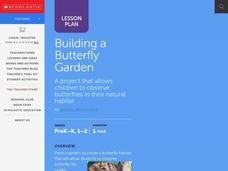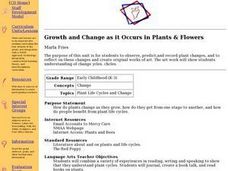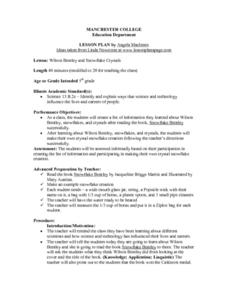Curated OER
Onion Skins
Students explore the structure of a plant cell. They carefully peel a single layer of onion skin from a slice of onion and stain it with methylene blue to observe the structures inside. They use a Digiscope connected to a computer to...
Curated OER
Where Are The Dinosaurs?
Students study the existence of dinosaurs as a precursor to learning about extinction. In this dinosaurs lesson, students watch dinosaur video at assigned web sites. They discuss what they observed in the videos including how the...
Curated OER
A Natural Habitat: What, How and Why
Students understand what a habitat is. They determine why a habitat is important to our environment no matter where it is located. Students observe and recognize natural habitats in their surroundings.
Curated OER
Building a Butterfly Garden
Young scholars plant a garden which will become the habitat for butterflies as they go through their life cycle. In this life cycle lesson, students grow plants that attract butterflies and feed caterpillars in order to observe the...
Curated OER
Floating Soap
Young scholars explore the density of soap. In this science lesson, students conduct an experiment to find which types of soap will float. Young scholars make a hypothesis and record their observations.
Curated OER
Life in a Log
Students identify insects living in rotting logs. In this decomposition instructional activity, students observe pieces of a rotting log, they look at the insects that have inhabited the log and create a chart that shows their findings.
Curated OER
An Introduction to 'Opae 'ula
Learners examine the 'opae 'ula. In this science lesson, students observe a live specimen and identify the major body parts. Learners construct habitat jars and observe the 'opae 'ula behaviors.
Curated OER
Exploring The Great Salt Lake
Second graders experiment with sand samples taken from a lake. They use this as part of an inquiry that is based on observations. The properties of the sand are observed in the lab and recorded in writing. Prior to the lab students...
Curated OER
The Radish Experiment
First graders grow radishes. In this Science lesson, 1st graders observe the growth of radishes in both the light and dark. Students discuss what plants need to live.
Curated OER
Just Bee-Tween Flowers!
Students examine the major plant and bee parts and the interdependency between bees and fast plants. They observe and record the stages of growth of fast plants, take photos of the plant's life cycle, and cross-pollinate plants.
Curated OER
Seed To Plant
Middle schoolers are introduced to alternative methods of growing techniques: specifically, hydroponics. They, in groups, "adopt" a seed. They take care of their seed and make observations as it begins to germinate.
Curated OER
Measuring Larval Growth and Development
Students keep a detailed records of the growth and development of their larvae. They fill out an observation chart every day during the larval stage, and every4-5 days during the pupa stage. They summarize all of their data on a class...
Curated OER
Growth and Change as it Occurs in Plants and Flowers
Students work together to observe plants and flowers through their life cycle. In groups, they make predictions and record changes in a journal. Using this information, they create their own original artwork and discuss the plants life...
Curated OER
Embryo Development
High schoolers observe the development of a chicken embryo. In this biology lesson, students compare and contrast the development of human and chick embryo. They make a chart and explain their findings to the class.
Curated OER
Wilson Bentley and Snowflake Crystals
Fifth graders read the book, 'Snowflake Bentley' by Jacqueline Briggs Martin. They gather and make a list of information about snowflakes and crystals. Then they make their own real crystal snowflake creation and observe the crystals...
Curated OER
Winter Lights: A Season In Poems & Quilts
Students read the book Winter Lights: A Season in Poems & Quilts and do language arts and math activities that go with the book. For this language arts and math lesson plan, students read the book given and do activities that include...
Curated OER
Water and Ice
Young scholars explore the states of matter. In this physical science lesson, students observe what happens to water when it freezes and record observations. Young scholars then observe ice when it melts and record observations.
Curated OER
The Solar System: Why do we Explore?
Third graders act as scientists. In this property discovery lesson, 3rd graders explore the substance "Oobleck" (cornstarch, water, food coloring). They work in groups to investigate the substance and make observations as a scientist...
Curated OER
Investigating Fingerprints
Students observe that each individual possesses a unique set of fingerprints. The Magic School Bus series of books, "Inside the Human Body," is used in conjunction with this lesson.
Curated OER
Wacky Water Critters
Students visit a local creek or stream. They collect water samples from the creek and observe and sort the "water critters" they find in the sample, observing smaller organisms under a microscope if necessary. They identify each organism...
Curated OER
Creating a Dichotomous Key for Families of Idaho Butterflies
Students are shown how to use the butterfly section of the Digital Altals of Idaho. They discuss how to make a dichotomous key. Students use their skills of observation and recognize defining characteristics that distinguish different...
Curated OER
Paper Sculptures
Students create paper sculptures. For this visual arts lesson, students observe photographs of abstract sculptures and describe their observations. Students use oaktag, tape, scissors, and markers to create their own paper sculptures....
Curated OER
Growth and Changes in Plants
Students investigate the growth and changes in plants. They view a video and discuss the changes in plants. They work in small groups to demonstrate vocabulary words to the class. They visit a green house and take pictures of plants to...
Curated OER
Day 5 - Science Plants - germination - growth- What plants do we need to survive?
Students look at the crops of the settlers. For this crop lesson, students discuss why each crop was important to the settlers and how they used it. They plant seeds and track and observe the growth.























